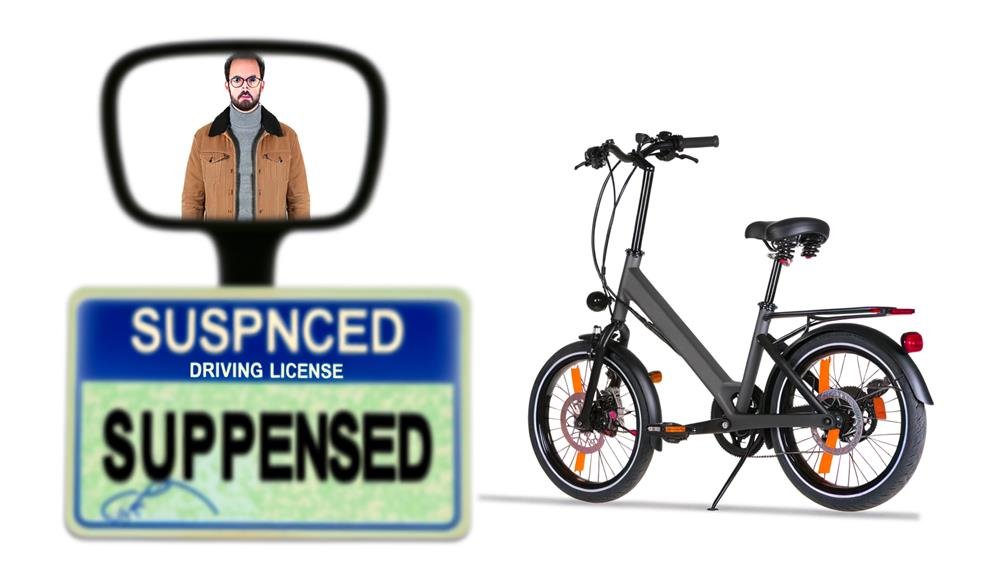Charles Miller is a veteran bike enthusiast with over 12 years of experience dealing with bikes as a mechanic. Despite immense love and expertise for...
In the rapidly evolving world of sustainable transportation, the electric bicycle (e-bike) has emerged as a popular choice for many.
Critical to the functionality of the e-bike is the motor, a feature that directly impacts performance and, by extension, cost.
The price of an e-bike motor can range significantly, largely influenced by factors such as the brand, type, and the associated features.
For instance, a standard 750-watt motor may cost anywhere between $300 and $600, with premium models potentially surpassing the $700 mark.
However, the cost doesn't end at procurement. There are additional considerations such as maintenance and warranties that can further contribute to the overall expenditure.
Thus, understanding the cost of an e-bike motor requires a comprehensive exploration that extends beyond the initial purchase price.
Stay with us as we dissect the various elements influencing the cost of e-bike motors.
- Key Takeaways
- Understanding Ebike Motors
- Varieties of Ebike Motors
- Factors Influencing Motor Cost
- Price Range for Ebike Motors
- Exploring 750-Watt Ebike Motors
- Pros and Cons of Expensive Motors
- Cost of Ebike Maintenance
- Warranties and Their Impact
- Affordable Vs High-End Ebikes
- Key Points to Consider
- Frequently Asked Questions
- Conclusion
Key Takeaways
- The cost of e-bike motors is influenced by factors such as motor wattage, brand reputation, technological advancements, conversion kits and additional components, and warranty and after-sales support.
- E-bike motors come in different wattage options, ranging from 250 watts for casual riders to 1000 watts for extreme off-road biking.
- Brand reputation plays a significant role in motor cost, with recognizable brands often charging more due to factors such as history, customer reviews, quality, reliability, and assurance of performance.
- The price range for e-bike motors varies from budget-friendly options to high-end versions, and consumers should consider factors such as brand reputation, quality, additional features, warranty guarantees, and motor wattage when making a decision.
Understanding Ebike Motors
Delving into the realm of e-bike motors, it's critical to understand that the motor's wattage significantly determines its power output, which in turn influences factors such as speed, torque, and the bike's climbing ability. A prime example of this is a 750-watt motor, which typically costs between $300 and $700, depending on the brand and features.
With increased power, a 750-watt motor offers the advantage of carrying heavier loads and provides faster acceleration, thus enhancing the overall experience and performance of the e-bike. One such model that incorporates this technology is the Macfox eBike, designed to traverse various terrains while offering a smooth ride.
Understanding ebike motors is not limited to the wattage alone. The cost of an electric bike, ranging from $600 to $8,000, is influenced by a multitude of factors, such as the motor type, size, battery, and bike style. Therefore, the choice of the motor should be based on a comprehensive evaluation of these aspects to ensure a balance between performance and cost-effectiveness.
Varieties of Ebike Motors
Having established the influence of wattage on an ebike's motor capacity, let's now explore the diverse range of ebike motors available in the market, each with its unique attributes and qualities. These e-bike motors are intricately designed to offer a seamless blend of performance, power, and endurance, providing riders with an unparalleled sense of belonging to the world of cycling.
- The 250 Watt Motor is perfect for casual riders who prefer a leisurely pace, offering sufficient power for city commutes and flat terrains.
- The 500 Watt Motor offers a balance between power and energy consumption, ideal for those who regularly commute or enjoy off-road biking.
- The 750 Watt Motor, as seen in the Macfox eBike, delivers impressive power and is suitable for rough terrains and carrying heavier loads.
- The 1000 Watt Motor represents the high-end of ebike motors, providing extraordinary power for extreme off-road biking and steep uphill climbs.
As we delve further into the world of e-bike motors, it's clear that there is a motor for every rider, each offering a unique blend of performance, power, and efficiency. It is about choosing one that aligns with your biking needs and style.
Factors Influencing Motor Cost
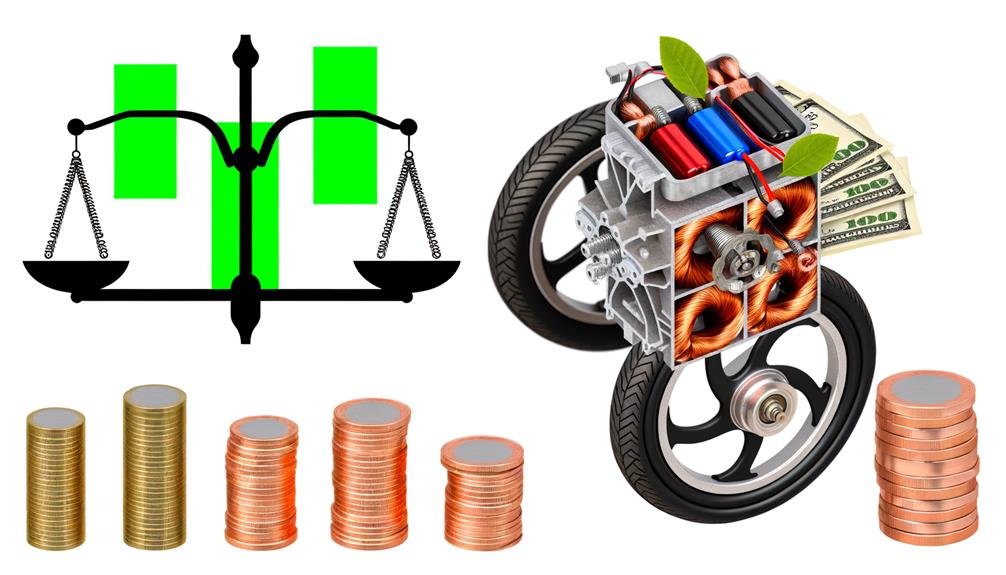
The cost of an ebike motor is not solely based on its core functionality but is influenced by several key aspects.
Among these, the quality of the motor, its power output, the reputation of the brand, and additional features, play significant roles in determining the price.
Furthermore, the type of warranty and support provided by the manufacturer can also impact the overall cost, indicating the complexity of price formation in this market.
Motor Quality and Price
In evaluating the cost of an electric bike motor, one must take into account several key factors including the quality of the motor, which is significantly determined by aspects such as brand, build materials, and additional features.
- Brand: Renowned brands often offer motors with superior quality, which can increase the price. However, they also tend to provide better after-sales service and warranty.
- Build Materials: The use of high-quality materials in the motor's construction can enhance durability and performance, but it can also raise the cost.
- Additional Features: Advanced features like energy efficiency or smart connectivity can add to the price.
- Long-term Performance: A more expensive motor may offer improved long-term benefits and performance, making it a worthy investment for many.
Influence of Brand Reputation
Navigating the ebike motor landscape, one quickly realizes that brand reputation significantly influences the price tag, with the prestige of established manufacturers often justifying a premium cost. When buying an E-Bike, consumers gravitate towards recognizable brands, assured by their history, customer reviews, and industry recognition. These factors constitute the brand's reputation, directly impacting the motor cost.
Brands known for their quality, customer service, and innovation can charge more, their reputation serving as a guarantee of reliability and performance. The desire for belonging to a community of satisfied users also drives the demand for these brands, further pushing their prices up.
Therefore, brand reputation plays a critical role in the cost variation of ebike motors.
Price Range for Ebike Motors
The price range for ebike motors is largely affected by various factors such as brand reputation, quality, and additional features. A comparative study of different motor prices reveals a broad spectrum, from budget-friendly options to more expensive, high-end versions.
Consumers must therefore weigh the relative merits of cost, quality, and warranty guarantees in their decision-making process.
Factors Influencing Motor Cost
Several critical factors determine the cost of ebike motors. These factors include wattage, brand reputation, technological advancements, the presence of conversion kits and additional components, as well as warranty and after-sales support.
- Wattage: The electric motor's power, measured in watts, directly influences the price. Higher wattage, like in a Mid Drive Motor, leads to a more powerful Electric Bicycle, thus increasing the cost.
- Brand Reputation: Renowned brands price their Rear Hub Motor or Front Hub higher due to the assurance of quality and durability.
- Technological Advancements: Innovations like brushless motors and superior Motor Controllers can increase the cost.
- Conversion Kits and Additional Components: The inclusion of an e-bike conversion kit, E-Bike Battery, or other components also affects the final price.
Comparing Different Motor Prices
Drawing upon the aforementioned factors, the price range of ebike motors varies significantly, with a standard 750-watt motor typically costing between $300 to $600, while premium models can reach up to $700.
In comparing different motor prices, it is crucial to consider additional factors such as brand reputation, motor quality, and unique features. Conversion kits, often bundled with motors, further complicate price comparisons.
While a more expensive motor might seem an unnecessary expenditure, the benefits including increased power, improved speed and acceleration, superior pedal assist functionality, and suitability for off-road excursions may justify the cost. Additionally, warranty and after-sales service are valuable considerations.
Therefore, a comprehensive comparison is crucial for finding the perfect balance between cost and quality.
High-End Versus Budget Motors
In the realm of ebike motors, discerning between high-end and budget options elucidates a significant price discrepancy. Premier 750-watt models generally range from $300 to $800, while their more economical counterparts typically fall within a $200 to $600 price bracket. This variance predominantly hinges on:
- Brand reputation and pedigree: Renowned manufacturers often demand a higher price for their high-quality high-end motors.
- Components' quality and durability: The better the parts, the steeper the price.
- Features and specifications: More advanced functionalities typically correlate with a higher cost.
- Warranty and after-sales service: A comprehensive warranty is a mark of a high-end motor, providing peace of mind and augmenting the product's perceived value.
Weighing the pros and cons of high-end versus budget motors will ultimately guide you towards the ideal investment.
Exploring 750-Watt Ebike Motors
While considering the diverse array of electric bike motors available in the market, the 750-watt variant stands out due to its unique blend of power, speed, and adaptability to different terrains. This motor type, typically found in e-bikes, offers a robust power output, allowing riders to reach speeds of approximately 28 miles per hour on level ground.
Factors such as rider weight, wind resistance, and slope can influence this speed, but the impressive torque of these motors ensures a consistent performance, even on challenging terrains. If you plan to use your e-bike for heavy-duty purposes or off-road riding, a 750-watt motor provides the necessary torque to climb steep hills while hauling additional weight.
The cost of a 750-watt electric bike motor varies, ranging from $300 to $700, influenced by brand reputation, product quality, and additional features. It's an investment that enhances your riding experience, enabling you to fully enjoy the benefits of riding an e-bike.
Ultimately, a 750-watt motor is a valuable addition to electric bikes for those desiring a balance of power and speed, making it a preferred choice among the e-bike community.
Pros and Cons of Expensive Motors
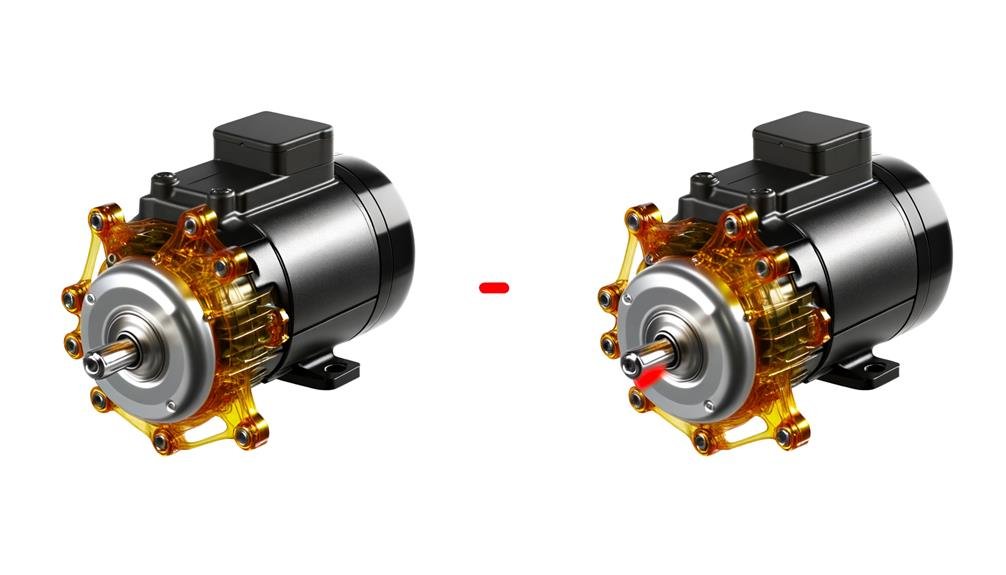
While expensive motors provide superior wattage and advanced features, enhancing e-bike performance, they pose a considerable investment that may not be suitable for all consumers.
Their ability to handle substantial weight and difficult terrains is a clear advantage, but the cost, ranging from $300 to $800, may present a significant drawback.
Therefore, a thorough cost-benefit analysis is crucial to determine if the benefits of these high-end motors genuinely outweigh their financial implications.
High-End Motor Advantages
Delving into the realm of high-end e-bike motors, one can discern both advantages and drawbacks. This can be primarily marked by superior performance, enhanced durability, advanced features, customization options, and notably, a higher cost.
- Superior Performance: These motors deliver outstanding power and acceleration, promising an exhilarating E-Bike experience that outclasses standard models.
- Enhanced Durability: Constructed from premium materials, high-end motors offer greater longevity, reducing the frequency and cost of replacements.
- Advanced Features: From cruise control to pedal assist, these motors provide a suite of advanced features to enhance your E-Bike journey.
- Higher Cost: The primary drawback is the substantial investment required, potentially deterring budget-conscious consumers from this high-performance realm.
Embracing a high-end e-bike motor can thus be a game-changer, offering tangible benefits to those seeking an elevated riding experience.
Drawbacks of Costly Motors
Navigating the terrain of high-priced e-bike motors, it becomes apparent that the substantial investment also brings along certain challenges. These challenges include a steep initial cost, potentially higher maintenance expenses, more expensive replacement parts, an increased risk of theft, and limited affordability for some potential buyers.
A higher initial cost can deter potential e-bike enthusiasts from purchasing a model with a costly motor, particularly one with a rear wheel configuration. Maintenance and replacement parts for these motors can also weigh more on the pocket, hindering long-term ownership.
The allure of a high-end motor can unfortunately increase the risk of theft, necessitating additional security measures. Lastly, the elevated price tag of these motors can limit accessibility, excluding potential buyers from the e-bike community.
Comparing Motor Price Points
Despite the challenges associated with costlier e-bike motors highlighted previously, it is crucial to examine the range of motor price points, weighing the advantages and disadvantages of investing in more expensive models.
Expensive motors offer increased power and speed, providing a more exhilarating ride.
Premium motors feature advanced options like excellent pedal assist and cruise control, enhancing the biking experience.
Top-tier motors, like the 750-watt model in Macfox eBikes, promise smooth rides across diverse terrains, affirming their value for money.
Costlier motors often come with longer warranties, giving owners peace of mind.
However, remember to account for additional costs such as maintenance and charging.
Ultimately, the motor choice should align with your biking needs and budget.
Cost of Ebike Maintenance
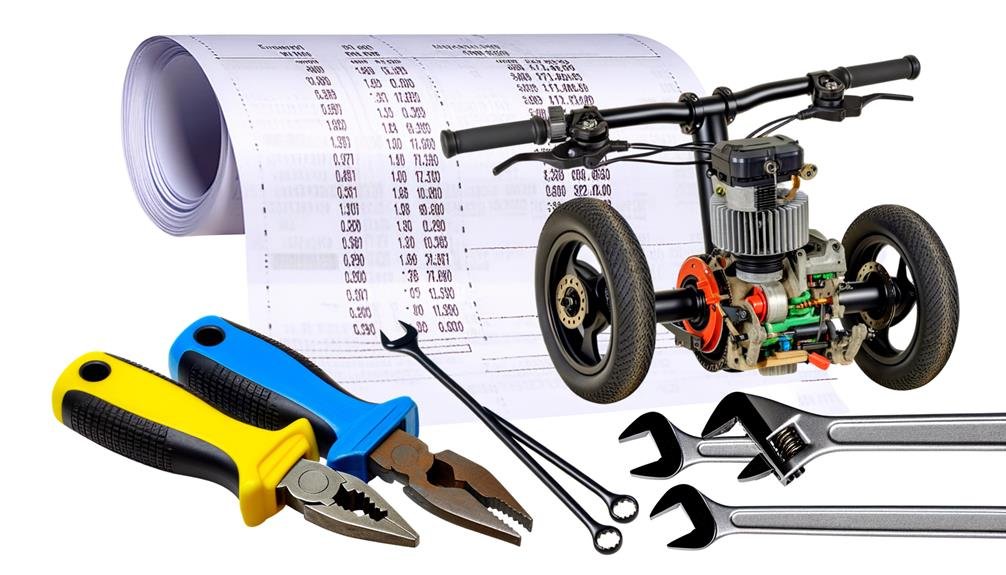
Understanding the expenses associated with ebike maintenance is crucial in evaluating the overall cost of ownership. These expenses can encompass tune-ups, tire replacements, and battery replacements ranging from $30 to $800. It's important to note that these costs are not just one-time expenses but recur over the ebike's lifespan, affecting the long-term affordability of this eco-friendly mode of transport.
As part of the maintenance, the hub demands attention. The hub is a vital component of the ebike as it houses the motor, and its performance directly affects the bike's performance and efficiency. Therefore, maintaining the hub in pristine condition is paramount. However, this may incur additional costs depending on the ebike's usage.
Battery replacement is another significant aspect of ebike maintenance. Typically, batteries last between 3 to 5 years, depending on usage. As a result, replacing batteries is an inevitable expense. It's worth noting that higher-end batteries can cost up to $800, which contributes significantly to the overall maintenance cost.
Considering these factors, potential ebike owners must account for these maintenance costs when planning their purchase. A detailed understanding of these expenses will help them make an informed decision, ensuring a seamless ebike experience.
Warranties and Their Impact
How does warranty coverage impact the overall cost of ebike ownership? The answer lies in understanding the intricacies of warranty coverage and their implications.
Warranties play a crucial role in determining the long-term costs of owning an ebike. They provide a safety net against unforeseen repair and maintenance expenses, thus reducing the overall cost of ownership.
- Duration and Coverage: Warranties for ebike components typically last for one to two years, while battery warranties may extend to three years. This means for a duration of 24-36 months, you are shielded from potential repair costs.
- Reduced Maintenance Costs: Warranties, particularly comprehensive ones, can significantly lower your out-of-pocket maintenance expenses.
- Peace of Mind: Knowing that your ebike is covered by a warranty provides a sense of security, reducing stress associated with potential malfunction or damage.
- Value for Money: Warranties can enhance the perceived value of your ebike. A two-year motor warranty, for instance, can add to the longevity of your ebike, making it a worthwhile investment.
Affordable Vs High-End Ebikes
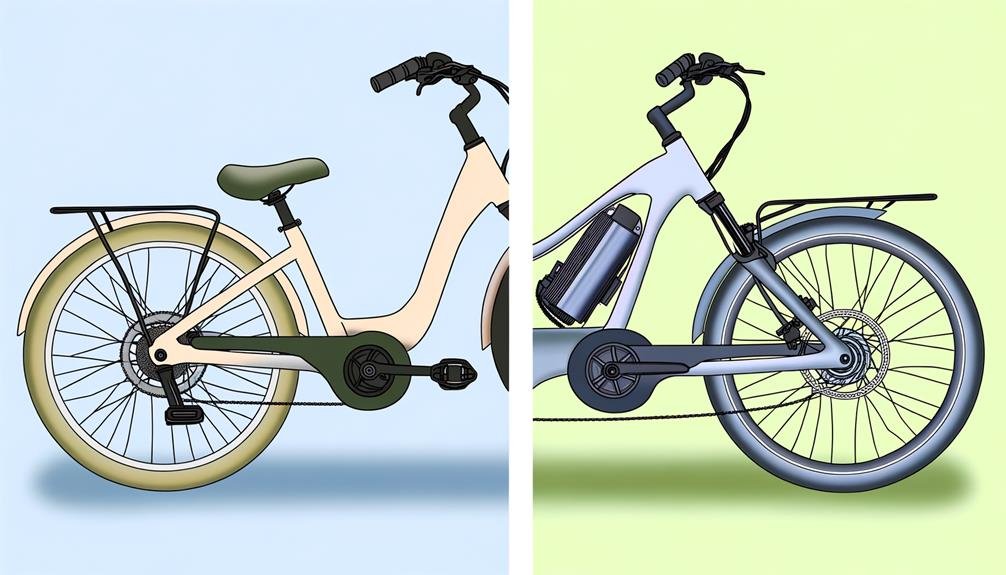
In the realm of ebikes, the choice between affordable and high-end models often boils down to a comparison of their motor capabilities, cost, and the value they offer in terms of performance, durability, and advanced features. Affordable ebikes typically come with a lower wattage motor, such as 250 or 500 watts, which keeps the price down, however, the performance may be compromised especially when climbing steep terrains. High-end ebikes, on the other hand, often feature powerful 750 watt or higher motors that deliver superior performance, but also come with a heftier price tag.
| Ebike Type | Motor Wattage | Cost Range |
|---|---|---|
| Affordable | 250-500 watts | $100-$300 |
| High-End | 750+ watts | $300-$700 |
The wheel's power and speed are directly impacted by the motor's wattage, making it a crucial component to consider. High wattage motors not only provide faster speeds but also make it easier to tackle difficult terrains. When considering an ebike purchase, it's important to weigh the motor's quality, warranty, and the specific benefits it offers in relation to the intended usage and budget.
Key Points to Consider
When selecting an ebike, it's crucial to evaluate several key factors. These include the wattage of the motor, the quality and brand of the bike, the size of the battery, the bike's frame material, and the potential maintenance and charging costs.
A well-chosen ebike could well become your trusted companion, offering a sense of belonging and freedom on the road.
Consider these four points:
- Motor Wattage: A higher watt motor, such as 750 watts, provides increased speed, torque, and performance. The Front Wheel drive powered by this motor offers better handling and balance.
- Quality and Brand: Top brands like Macfox offer high-quality motors designed for various terrains, ensuring durability and efficiency.
- Battery Size: Bigger batteries mean longer rides. However, it also means higher charging costs. Strike a balance based on your usage.
- Frame Material & Maintenance: The frame material impacts the bike's weight and durability. Consider potential maintenance costs before making a purchase.
These factors not only affect the initial ebike motor cost, but also the long-term value and performance of your ebike. Making a thoughtful choice allows you to enjoy a seamless, worry-free ride.
Frequently Asked Questions
How Much Does It Cost to Replace the Motor in a Ebike?
The cost of motor maintenance for an ebike, specifically for a replacement, typically lies between $300 and $600. Premium models may reach up to $700. This range considers factors like brand quality and additional features.
How Long Do Motors Last on Ebikes?
Motor durability in ebikes is influenced by usage, maintenance, and quality, typically lasting between 3,000 to 10,000 miles. Proper care and high-quality components can extend this, offering riders sustained, reliable performance.
How Fast Does a 1000w Motor Ebike Go?
In full throttle, a 1000W motor eBike can hit the high note of approximately 28 mph, considering factors like terrain and wind resistance. However, speed regulations may put a cap on this swift performance.
What Is the Price of 750 Watt Motor?
The price of a 750-watt motor, often influenced by factors such as brand and motor efficiency, typically ranges from $200 to $800. High-quality, efficient motors with extended warranties may command a premium price.
Conclusion
In conclusion, the cost of an e-bike motor is influenced by various factors, notably type, brand, quality, and features.
On average, a 750-watt e-bike motor ranges from $300 to $600, with premium models reaching up to $700.
Apart from the initial purchase, maintenance costs and warranties also bear significance.
Therefore, when investing in an e-bike motor, it is crucial to consider these elements to ensure a cost-effective and quality purchase.

Charles Miller is a veteran bike enthusiast with over 12 years of experience dealing with bikes as a mechanic. Despite immense love and expertise for his Tacoma, he rides his Trek Ebike more. Anytime you meet him, you’ll either hear him talking about Bikes, or writing about all things bikes and cars on this blog.
More Posts

